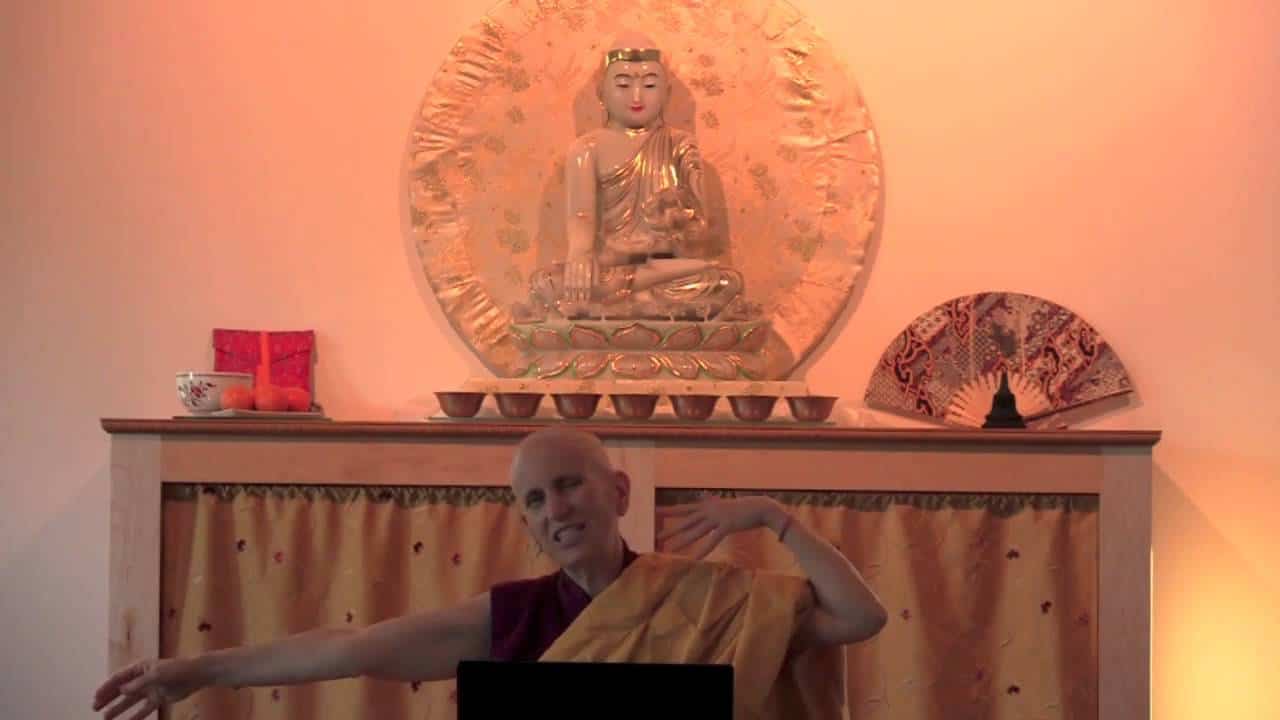Verse 38: The skilled merchant
Part of a series of talks on Gems of Wisdom, a poem by the Seventh Dalai Lama.
- Giving with expectation of return is much like doing business
- Strive to cultivate a clear motivation when giving charity
Gems of Wisdom: Verse 38 (download)
Verse 38:
Who is but a skilled merchant among beings of the world?
The patron who gives charity hoping to get a return.
“Who is but a skilled merchant among beings of the world? The patron (or donor) who gives charity (or dana, generosity) hoping to get a return.”
In the world, everybody encourages generosity. And everybody thinks sharing and giving and being charitable is a good quality. It’s very easy for the eight worldly concerns to come into our giving of charity, and to contaminate our generosity, because the thought comes, “Oh, if I give this, then…
- “…other people will think that I’m very generous and it’ll help my reputation.”
- “…other people will know my business is going well.”
- “…I’ll get special perks.”
- “…I’ll get my name mentioned here and there and the people in charge of the Dharma Center—or the people in charge of the hospital—will do nice things for me when they have a teaching or a big banquet.”
- “…I’ll get to sit in front with the important people….”
You know that mind?
Even in another way, maybe we’re just giving something to a friend, but our mind is thinking, “Oh, now they’ll like me.”
How much is our being kind to people, or being generous, done with a pure motivation? And how much of it is done with an ulterior motivation, wanting some ego perks? It’s actually kind of hard to give completely without that expectation of receiving anything in return. But this is exactly what we’re aiming for. Because whenever we give with a motivation to receive we’re actually like the merchant that’s being referred to in the verse. We’re doing business. Okay? So I give you this and then in return:
- You like me.
- Or you give me perks.
- Or I get a good rebirth.
- Or I get wealth in a future life.
- Or…. I get something out of this.
This is one reason why, at the Abbey, we don’t charge for any of the events that we have here. On some of the longer events we ask people to give dana, that supports the entire group being able to come. And so that’s very different than people paying for themselves. We encourage people to ask their friends and family and whoever to contribute to the dana. And very often if people can’t give that, then they just bring whatever they have. But, by and large, people come here for shorter activities and there’s no payment asked of them. Also for the books and so forth that are downstairs, that’s all freely given. That’s because we want to live our lives as ones of generosity, and we want to encourage other people to be generous, too. Because then everybody creates merit. But if you charge for events, you charge for books and things, then it’s doing business. Isn’t it? And at the time of the Buddha, the Buddha never charged anybody to go to any teachings. Everything was freely offered.
And Dharma should not be just for rich people. Healthcare shouldn’t just be for rich people. Food shouldn’t just be for rich people. I think these are things that everybody deserves. And if there’s some way just of giving and then hoping people will give in return then everybody creates the merit that ripens in everybody having what they need. But when you charge and everybody’s doing business then there’s no merit. And then you get the kind of thing of “well let’s see how much we can charge so that people will still come….” And really that’s not so nice. And it really feels much better when you can live your life as a life of generosity.
In line with this, you know, I receive many invitations to go different places to teach, in considering where to go and where not to go, how much dana people give is not one of the criteria I consider. I consider the earnestness of the people who are inviting, and their receptivity to the Dharma.
This can be very difficult sometimes for lay teachers when they are relying on the dana that they receive to feed their family and educate their children and everything. Whereas, being a monastic it’s much easier. We don’t have kids and we don’t have a lot of stuff that lay teachers need to support their regular lifestyle.
But still, as monastics we have to be very careful with our motivation. And so this verse is for everybody to really pay attention to, and try as much as we possibly can to just give and take delight in giving. And that delight we take in giving is actually the “return.” That alone is good enough.
Whether people praise us or not, thank us or not, appreciate us or not, that we place aside. That is not what we’re looking for. But just the satisfaction that arises within ourselves of being able to give. Whether what we’re giving is something big or something small. Just the delight that comes in giving becomes its own reward. That’s what we’re aiming for.
Venerable Thubten Chodron
Venerable Chodron emphasizes the practical application of Buddha’s teachings in our daily lives and is especially skilled at explaining them in ways easily understood and practiced by Westerners. She is well known for her warm, humorous, and lucid teachings. She was ordained as a Buddhist nun in 1977 by Kyabje Ling Rinpoche in Dharamsala, India, and in 1986 she received bhikshuni (full) ordination in Taiwan. Read her full bio.


